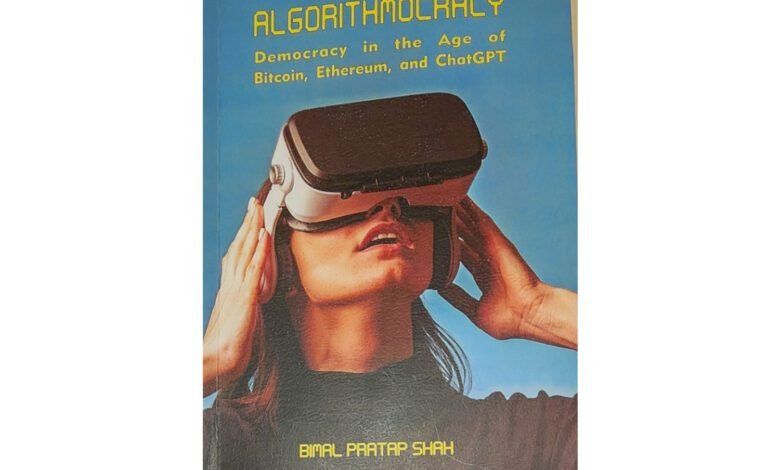A fusion of technology, politics, religion and economics

In November 2022, Nepal conducted its federal elections using ballot papers and did not use electronic voting machines, despite using them in the first Constituent Assembly elections. Due to growing concerns about technology affecting the integrity of elections, the Electoral Commission has had to issue a code of conduct on social media.
In April 2023, Nepal Rastra Bank banned the use of cryptocurrencies, including stablecoins, NFTs, digital assets, decentralized finance or any form of virtual currency. Afterwards, the Nepal government banned TikTok in November 2023 to safeguard social harmony.
Amidst these digital disruptions, Bimal Pratap Shah, former employee of the National Center for Information Technology, researcher at the Center for E-Governance and consultant to the World Bank of Nepal, published his book titled ‘Algorithmocracy’ where he offers a compelling narrative of as emerging technologies like Algorithms, Blockchain, AI and ML, Metaverse will revolutionize the concept of democracy, governance and regulatory frameworks.
He deftly explores the intersection between technology, politics, religion, and economics and how these concepts merge to create a philosophy that will recalibrate our thought process.
The subtitle, ‘Democracy in the Age of Bitcoin, Ethereum and ChatGPT’, gives readers broad ideas about what to expect from the book. Shah deftly dissects complex issues of representative and direct democracy, paradigm shift in governance, new value creation powered by blockchain, and failure of our leadership to harness this power, which has led to a lack of citizen participation and engagement.
ChatGPT defines Algorithmocracy as a theoretical concept and its viability, desirability and potential implications for our society are up for debate, highly futuristic and utopian. Seen from this perspective, the book is ahead of its time and it is fascinating how a Nepali author created a work that transcends the barrier of time.
The book has two parts. The first part is a compilation of Shah’s articles published in newspapers covering topics ranging from future technology, paradigm shift, metaverse world, Blockchain, Bitcoin, Ethereum and mysterious concepts such as Tragedy of the Commons, libertarian municipalism, Austrian economics and even imagination of religion in the modern world which he titled ‘Post-Secular World: Is God Dead?’.
The central theme of these articles is how digital transformation is changing the political system, enabling a direct democratic process as we travel through the 18th century world in an ox cart. This is the need for political leadership that is prepared for the era of autonomous cars, cryptocurrencies and the city as a platform and that understands that the new governance system will be based on blockchain and algorithms that lead to direct democracy.
The author shows how advanced the world of AI has become, and he does this by showing a well-written and immaculate article written by ChatGPT about corruption in Nepal.
Although technology has become a tonic for freedom and democracy, the author is also careful to mention that it is not a panacea. Shah writes that the world needs Magna Carta 2.0 to ensure that technology is used to serve humanity, science, knowledge and democracy.
The Internet and technologies like Bitcoin and cryptocurrency are sovereign neutral and governments have no control over them. He advocates regulating cryptocurrencies and similar innovations rather than banning them, which he considers a regressive move.
Referring to Klaus Schwab, executive chairman of the WEF, Shah writes: “It is not – the big fish world eats the small fish, but rather – the fast fish world eats the slow fish.”
The corollary of this statement is that disruptions have become a norm in the 21st century and our organization, companies, culture, spirit and leadership are vulnerable to large-scale disruption brought about by technology. It cannot be avoided by banning them.
The second part of the book explains the key concepts of digital evolution in simple terms, which is useful for someone who is at the basic level of the digital world. The author explains concepts such as Bitcoin, Blockchain and its future, algorithms and the world of computing, personalities from the cryptographic world such as Satoshi Nakamoto and Vitalik Butarin, consensus mechanisms such as POW versus POS, FTX, NFTs, direct democracies, etc.
The second part is a collection of some existing and emerging new ideas from the digital world; some of which are very well explained with relevance while others could have been explained better. Some concepts, like how machine learning works and emerging technologies like sand batteries, sweat-powered smartwatches, and xenotransplantation, are very captivating.
The topics covered are important pieces in the world of technology and the author’s expertise on the subject is clearly visible, however, he could have narrated better by weaving stories around the subject instead of sharing the facts and figures in watertight boxes. For example, readers may not be interested in knowing facts about Silk Road, but rather about how Ross Ulbrict operated his illicit operations under the radar.
The book is a treasure trove of knowledge required in the digital age, but is marred by many editing errors. In several chapters, paragraphs are repeated word for word, as if it were a draft. Likewise, errors such as inadvertent repetitions, incomplete sentences, and changes in source for no discernible reason make it difficult to seamlessly absorb the book’s abundant wealth of knowledge.
As the first part of the book is a collection of articles originally published in different newspapers, some ideas and concepts are repeated throughout the chapters.
Despite the editing errors, Bimal’s passion and knowledge for technology and leveraging it to drive progress in Nepal is truly inspiring. This book is not just about technology or politics. But rather about how the transformation in technology transforms political values, ideologies, concepts, nations and ethos and gives rise to a new class of techno sapiens.
The book serves as a timely and indispensable guide in delivering political goods and explains why Nepal must progressively embrace these changes to reap the benefits of the fourth industrial revolution and avoid a dystopian future. While all technology enthusiasts will enjoy reading and learning from Shah’s collection of esoteric insights, this is a must-read for politicians, legislators, and bureaucrats.
Albert Einstein famously said “Imagination is more important than knowledge”, which resonates deeply with the thought-provoking concept of Algorithmocracy and how it can potentially reshape the future of social organization and pave the way for new possibilities. Through his book, Shah gives readers an idea of what the future will be like and manages to stimulate readers’ curiosity and imagination.
Siddhi is the head of transaction banking at SCB Nepal.
Algorithmocracy
Author: Bimal Pratap Shah
Year: 2023
Publisher: Repro Vision Press




